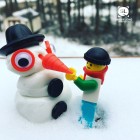I’m fascinated by your decision to shift point of view multiple times in such a compact narrative space. You begin with second-person plural (we) and then revert to first person (I) and back again throughout. What motivated this decision? What did you want to accomplish?
Originally I was interested in a group narrative, and early drafts were only in second-person plural. But in the course of revision, I had a feeling something wasn’t working. I knew this wasn’t a story about a group so much as a story about independence, but it wasn’t until I brought in the narrator’s solo voice that it fully came together. Most of my high school experience was an internal conflict between wanting to be in the group and not wanting to be in the group. The switch to first person was a direct nod to that conflict: a teenaged girl wants to be liked but also wants to be herself.
The story’s narrative question—whether or not the teen protagonists should get phones for hands—is a beautiful metaphorical device that suggests a host of coming-of-age readings and is a wonderful foil for the sanctity of touch in the final scene. What did you hope this question would impart to readers about teenhood, decision-making, and/or growing up?
Whenever I wanted something that all of my friends had, my dad would say (in the way only dads can), “If everyone else jumped off a bridge, would you?” I’d always roll my eyes (of course), but I think this was a subconscious prompt for “Second Base.” I was a teenager just before the proliferation of cell phones, so I’m especially fascinated by what technology has done to teenage friendships/relationships. Most teenagers “hang out” online. They no longer go to the mall or the movies, and most of their flirting is done via Snapchat or some other app I probably don’t know how to use. I’ve been thinking about what happens to our relationships with humans when those relationships are filtered through a phone. Remember when flirting was passing love notes during European history? Now flirting is a bunny ears filter and emojis and the ability to carefully curate your life. It’s a weird thing where technology has made us all grow up too fast and yet not grow up fast enough.
Similarly, the image of phones for hands immediately made me think of biohacking and especially Donna Haraway’s “A Cyborg Manifesto.” Her central argument—that a cyborg is a model of hybridity that frees us from dependence on binaries—is interesting to read against your final scene, where the narrator and Devin root themselves fully in human touch. Did you intend this piece to offer a commentary our relationship with technology or posthumanism? If so, what?
I haven’t read “A Cyborg Manifesto,” but I will now! I’m definitely interested in our relationships with technology, particularly as technology takes on a more and more human form. And with this story, I was curious whether the girls who decide to get phone hands will ultimately be more independent, more able to achieve their dreams. Lack of access to technology is a barrier for many. If you don’t have the internet, much of the world—jobs and house-hunting and socializing, just to name a few—can feel inaccessible. The girls who decide in favor of phone hands are making a choice to move ahead. You could applaud them for that choice. The narrator and Devin will likely be left behind, though their personal relationships may be stronger and more fulfilling. I think I would prefer the latter.
I personally have a love-and-hate relationship with technology, so I’m often exploring whether technology is good, bad, or somewhere in the middle. I haven’t come to a conclusion yet, but I will say that writing these answers to you on a computer is much easier than handwriting!
I loved your revision of Dickinson’s “I dwell in possibilities” to “I dwell in indecision,” which comes at a moment when the narrator is debating her prom pairing and remembering a sexual encounter with Devin. What other writers are you reading and incorporating? Who else informs your work?
Thank you! As weird as this sounds, I do a lot of YouTube research for stories, to get down a voice and to develop a story’s language. I keep a massive document of conversation bits, weird words, and vocal tics. Whenever I’m in need of inspiration, I turn to the document. Sometimes the research is obvious (e.g., I’ll watch women selling makeup as research for a story about makeup). Other times I’m looking more for a feeling or a vibe. Maybe it’s a Disney star talking about achieving his/her dreams or it’s a yoga instructor talking about the importance of essential oils. My YouTube search history is a weird place.
And of course I’m also reading. I re-read Saunders’ Tenth of December and Pastoralia quite a bit, and lately I’ve been spending time with Jenny Zhang’s Sour Heart, which is hilarious and heartfelt and just brilliant.
Finally: What’s the best piece of advice you’ve ever heard or have to offer on writing a killer piece of flash fiction?
- Don’t overexplain!
- Leave room for the story in what’s not said.
So often my early drafts are explanation followed by explanation. Over time I’ve learned to cut back excess and to trust the reader. A piece of flash isn’t meant to be a dissertation. It’s meant to be a slice of the larger pie. You know what you’re eating is pie. You know it’s apple or pumpkin. You have an idea of what the pie looks like whole, but because you only have a slice, you’re going on faith. I think that’s what flash is at its core: a slice of pie, a little faith.



 The core workshop of SmokeLong Fitness is all in writing, so you can take part from anywhere at anytime. We are excited about creating a supportive, consistent and structured environment for flash writers to work on their craft in a community. We are thrilled and proud to say that our workshop participants have won, placed, or been listed in every major flash competition. Community works.
The core workshop of SmokeLong Fitness is all in writing, so you can take part from anywhere at anytime. We are excited about creating a supportive, consistent and structured environment for flash writers to work on their craft in a community. We are thrilled and proud to say that our workshop participants have won, placed, or been listed in every major flash competition. Community works.